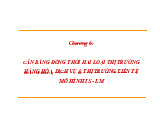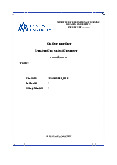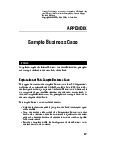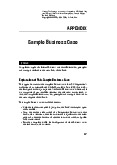









Preview text:
ÔN THI THPT NĂM HỌC 2019
MÔN TIẾNG ANH CÓ ĐÁP ÁN
Mark the letter A, B, C, or D to indicate the word whose underlined part differs from the
other three in pronunciation in each of the following questions. Question 1: A. creates B. faces C. strikes D. cigarettes Question 2: A. heir B. handle C. hold D. humane
Mark the letter A, B, C, or D to indicate the word that differs from the other three in the
position of the primary stress in each of the following questions. Question 3: A. effect B. effort C. deafness D. cancer
Question 4: A. decoration B. economy C. expectation D. universal
Mark the letter A, B, C or D to indicate the correct answer to each of the following questions.
Question 5: - "Why don't you ask Tom to do it?"
- "I don't know whether he is ____ to. He sometimes makes things worse." A. possible B. afraid C. easy D. able
Question 6: Although Anne is happy with her success she wonders ____ will happen to her private life. A. which B. what C. when D. that
Question 7: You can ____ what is happening on the other side of the world by telephone. A. see B. make C. hear D. learn
Question 8: It is our ____ policy that we will achieve unity through peaceful means. A. consistent B. continuous C. considerate D. continual
Question 9: I really want to become a pilot when I ____. A. grow up B. talk about C. agree with D. get up
Question 10: We are aware that, ____, the situation will get worse.
A. unless dealing with carefully
B. if dealt not carefully with
C. if not carefully dealt with
D. if not carefully dealing with
Question 11: Never before ____ more foreign tourists to Viet Nam.
A. have there been B. there have been C. were there D. there were
Question 12: Justin is writing a book about his adventure in Tibet. I hope he can find a good publisher when he ____. A. finished B. has finished C. will finish D. is finishing
Question 13: I found it very stressful living in the centre of town, so I was pleased when we
moved to a quiet residential area in the ____. A. edge B. suburbs C. estate D. outskirts
Question 14: A recent survey identified the UK as ____ place in Europe to buy a car. A. an expensive as B. the more expensive C. the expensive D. the most expensive
Question 15: Philip dressed in strange clothes and wore a mask on his face for a party. He
was completely ____. No one knew who he was. A. recognizing B. recognizable C. unrecognizable D. unrecognizing
Question 16: ____ studies have found that while the learning process may be slower,
healthy older people can usually learn new things well. A. To repeat B. Repeated C. Repeating D. Repeat
Question 17: The government ____ major changes to the education system recently. A. warned B. declared C. announced D. expressed
Question 18: The packages just mailed at the post office will arrive on Monday, ____? A. won't they B. will they C. did they D. didn't they
Mark the letter A, B, C or D to indicate the word(s) CLOSEST in meaning to the
underlined word(s) in each of the following questions.
Question 19: I unexpectedly met a very old friend yesterday. In fact, we hadn't seen each other for several years. A. looked into B. ran into C. ran over D. looked for
Question 20: Trudy felt ill at ease when she had to speak in public for the first time.
A. felt uncomfortable and embarrassed
B. lost confidence and got angry
C. felt challenged and inopportune D. felt nausea and dizzy
Mark the letter A, B, C or D to indicate the word(s) OPPOSITE in meaning to the
underlined word(s) in each of the following questions.
Question 21: It was quite a rocky relationship as we used to argue with each other all the
time and we sometimes went days without speaking to each other. A. stable B. appalling C. unsteady D. better
Question 22: I need to catch up on world events. I haven't seen the news in ages. A. go ahead with B. catch sight of C. become outdated D. watch the news
Mark the letter A, B, C or D to indicate the option that best completes each of the
following exchanges. Question 23:
- "Do you read novels or detective stories?” - “____”
A. I enjoy detective stories a lot more.
B. Why novels? No more of them.
C. Yes, novels or detective stories. D. No, I don't have any. Question 24: - “____” - “He's very outgoing.”
A. What does your new roommate like?
B. What does your new roommate look like?
C. Are you and your new roommate alike?
D. What's your new roommate like?
Read the following passage and mark the letter A, B, C, or D to indicate the correct word
that best fits each of the numbered blanks from 25 to 29.
When you first arrive in a foreign country, your initial reaction is often completely
positive. Everything seems exciting, different and fascinating. It's (25) ____ adventure. If
you're just on a short holiday, you'll probably never leave this phase, but if you stay longer,
your attitude towards your (26) ____ environment can start to change.
As soon as you start to realize how little you understand the new culture, life can get
frustrating. People misunderstand (27) ____ you're trying to say, or they may even laugh at
you for saying something incorrectly. Even simple things, like posting a letter, can seem
impossibly difficult, and you are likely to (28) ____ by getting angry or upset when things go wrong.
With time, however, you start to adjust to become more comfortable with the
differences and better able to handle frustrating and embarrassing (29) ____. Your sense of
humour reappears. Finally, you reach the stage of feeling able to be enthusiastic about the
culture once again, enjoy living in it, and maybe even prefer certain aspects of the culture to your own. Question 25: A. a B. an C. the D. Ø Question 26: A. new B. original C. old D. natural Question 27: A. how B. when C. which D. what Question 28: A. outdo B. overcome C. overreact D. overflow
Question 29: A. conditions B. locations C. situations D.circumstances
Read the following passage and mark the letter A, B, C or D to indicate the correct answer
to each of the questions from 30 to 34.
Many people believe the glare from snow causes snow-blindness. Yet, dark glasses or
not, they find themselves suffering from headaches and watering eyes, and even snow-
blindness, when exposed to several hours of "snow light".
The United States Army has now determined that the glare from snow does not cause
snow-blindness in troops in a snow-covered country. Rather, a man's eyes frequently find
nothing to focus on in a broad expanse of a snow-covered area. So his gaze continually shifts
and jumps back and forth over the entire landscape in search of something to look at.
Finding nothing, hour after hour, the eyes never stop searching and the eyeballs become sore
and the eye muscles ache. Nature balances this annoyance by producing more and more
liquid which covers the eyeballs. The liquid covers the eyeballs in increasing quantity until
vision blurs. And the result is total, even though temporary, snow-blindness.
Experiments led the Army to a simple method of overcoming this problem. Scouts
ahead of a main body of troops are trained to shake snow from evergreen bushes, creating a
dotted line as they cross completely snow-covered landscape. Even the scouts themselves
throw lightweight, dark-colored objects ahead on which they too can focus. The men
following can then see something. Their gaze is arrested. Their eyes focus on a bush and
having found something to see, stop searching through the snow-blanketed landscape. By
focusing their attention on one object at a time, the men can cross the snow without
becoming hopelessly snow-blind or lost: In this way the problem of crossing a solid white area is overcome.
Question 30: To prevent headaches, watering eyes and blindness caused by the glare from snow, dark glasses are ____. A. indispensible B. useful C. ineffective D. available
Question 31: The eyeballs become sore and the eye muscles ache because ____. A. tears cover the eyeballs
B. the eyes are annoyed by blinding sunlight
C. the eyes are annoyed by blinding snow
D. there is nothing to focus on
Question 32: According to the passage, snow-blindness may be avoided by ____.
A. concentrating on the solid white terrain
B. searching for something to look at in snow-covered terrain
C. providing the eyes with something to focus on
D. covering the eyeballs with fluid
Question 33: The underlined word “they” in the third paragraph refers to ____. A. experiments B. scouts C. main troops D. bushes
Question 34: A suitable title for this passage would be ____.
A. Snow-blindness and How to Overcome It
B. Nature's Cure for Snow-blindness
C. Soldiers Marching in the Snow
D. Snow Vision and Its Effect on Eyesight
Read the following passage and mark the letter A, B, C or D to indicate the correct answer
to each of the questions from 35 to 42.
Some cities are located by chance. A wagon breaks down, the driver spends some
time in repairs, finds that he is in a congenial spot, and settles down. Later another person
builds a house near his, and later someone adds an inn. Someone else starts selling farm
produce there. Soon there is a little market, which grows to a town, and later to a city.
Other places were destined by nature to become cities. London, for example, is on
what is called the head of navigation - the point where it becomes too difficult for ocean-
going ships to continue upriver, and must transfer their cargoes. As with London, the head of
navigation is also the point where the river can be conveniently bridged. In fact, the location
of a bridge is often the reason for the birth of a town - as Cambridge or Weybridge in
England show. Again, a good harbour will generally lead to a city growing up about it. New
York and San Francisco began life as ports, as did Cape Town in South Africa.
Some places were created mainly for military purposes, such as Milan, and the host of
English cities finishing with - cester, which is derived from castra which means camp in
Latin. Chester itself, created to guard the Welsh border, is a very good example. Other such
military bases are Manchester, Doncaster, and of course, Newcastle.
A few cites are not created by accident, but by intention. This was the case with
Milton Keynes in England, but the most famous examples of such cities are capitals.
Brasilia, Canberra and Washington are capitals created in modern times, but even their
greatest admirers will admit that they lack a certain character. It is no co-incidence that there
are famous pop songs about New York, ("New York, New York") Chicago ("My kind of
Town") San Francisco ("Going to San Francisco") and many other US cities, but none about
the nation's capital. On the other hand any Londoner can give you at least three songs about the place.
Question 35: This reading passage is mainly about ____.
A. why capital cities are created
B. places where cities might begin
C. famous cities and urban life
D. why some city sites are chosen
Question 36: The word "congenial” in the first paragraph probably means ____. A. pleasing B. noisy C. related D. favourable
Question 37: According to the passage, London owes its origin to ____. A. a river B. a bridge C. an army camp D. a countryside ship
Question 38: The passage suggests that a large harbour ____.
A. may lead to the development of a big city
B. is important for import/export
C. is a place where wars start
D. is always located in capital cities
Question 39: The passage suggests that English cities of military origin ____.
A. can be found from their locations
B. can be found from their names
C. are more common than other cities D. always end with -cester
Question 40: It can be inferred from the passage that the word “ " has ____ roots. Chester A. Italian B. Roman C. Latin D. Latin American
Question 41: Which of the following is NOT given as a reason for a new city? A. Random events B. Wars C. Trade D. Politics
Question 42: There are no songs about Washington because ____. A. it is the national capital B. it is too modern
C. the city has little character
D. songwriters don't like politics
Mark the letter A, B, C or D to indicate the underlined part that needs correction in each
of the following questions.
Question 43: Though its mouth is big, but a crocodile can swallow only small animals.
Question 44: More schools have built recently to make it convenient for children to receive education.
Question 45: When an Arab wants to know if his camel can make a long journey in the
desert, he looks for at its hump to see how large and firm it is.
Mark the letter A, B, C, or D to indicate the sentence that is closest in meaning to each of
the following questions.
Question 46: Because he came to class late, the teacher punished him.
A. The teacher punished him if he came to class late.
B. He came to class late, but the teacher punished him.
C. The teacher threatened to punish him if he came to class late.
D. The teacher wouldn't have punished him if he hadn't come to class late.
Question 47: "Why don't you ask the Council for help?" my neighbour said.
A. My neighbour advised me to ask the Council for help.
B. My neighbour recommended asking the Council for help.
C. My neighbour told me not to ask the Council for help.
D. My neighbour wants to know why I don't ask the Council for help.
Question 48: After many long and tough hours of practice, Rita finally became an accomplished pianist.
A. Rita accomplished many long, tough hours of practice and became a pianist.
B. Rita's long and tough hours of practice helped her become an accomplished pianist.
C. After becoming an accomplished pianist, Rita spent many long, tough hours of practice.
D. Rita spent many long, tough hours accomplishing her piano practice.
Mark the letter A, B, C, or D to indicate the sentence that best combines each pair of
sentences in the following questions.
Question 49: She chose to study accounting. Accounting has good employment prospects.
A. She chose to study accounting because of its good employment prospects.
B. Choosing to study accounting, she has good employment prospects.
C. She chose to study accounting so that it has good employment prospects.
D. Having good employment prospects, accounting is good for her to study.
Question 50: It isn't just that the level of education of this school is high. It's that it's also been consistent for years.
A. The level of education in this school, which is usually quite high, shows only
slight variations from year to year.
B. The standard of education is not high in this school, but at least all the students are at the same level.
C. Not only are the standards of education good in this school, but it has maintained
those standards over the years.
D. It isn't fair to deny that this school is successful, as it has had the same high standards for many years now.




